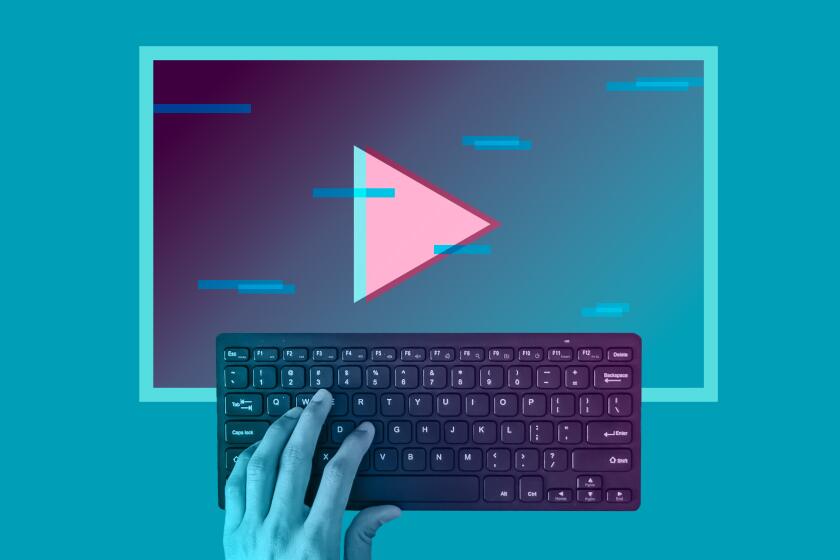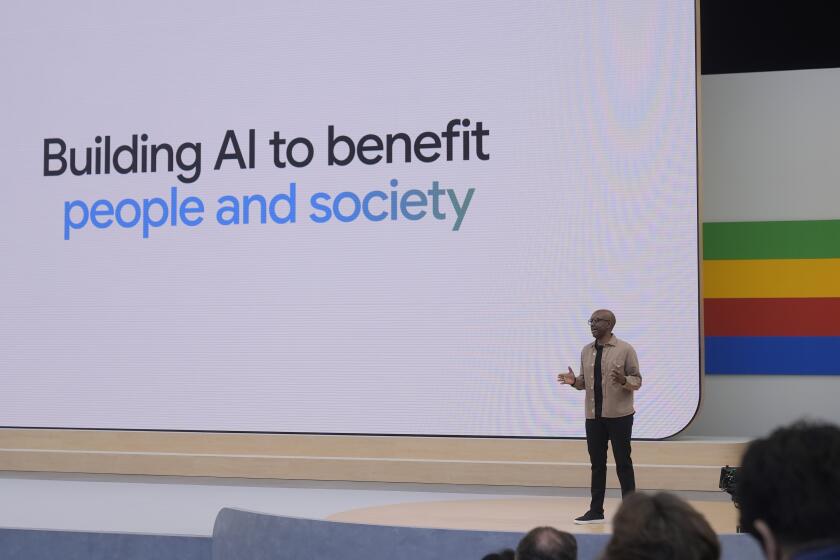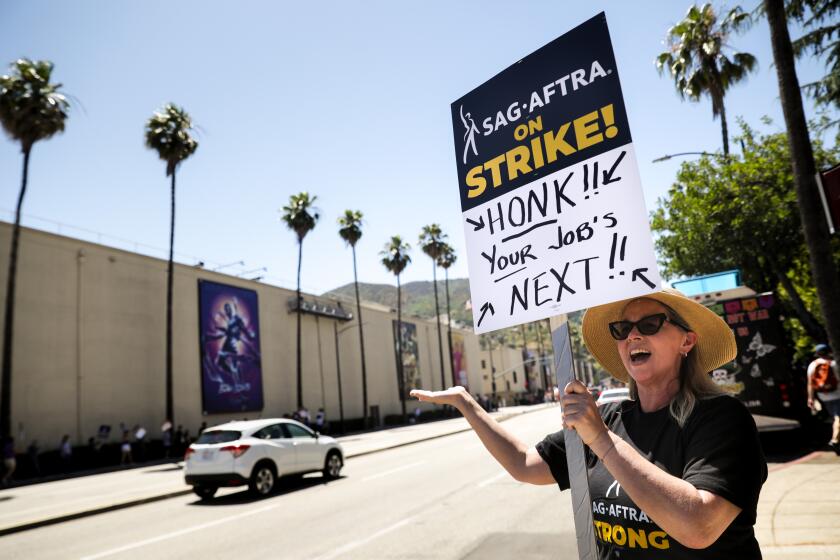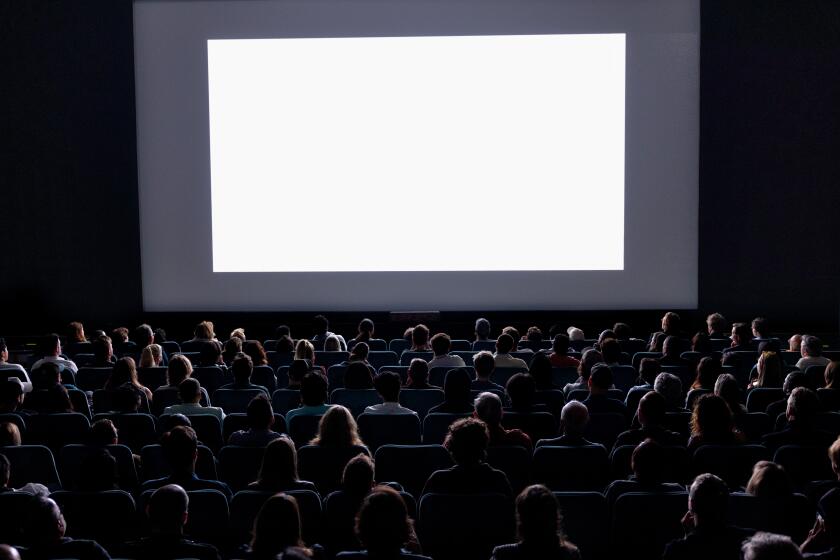(Jim Cooke / Los Angeles Times)
- Share via
While working as a cinematographer on the second season of “Star Trek: Strange New Worlds” in April 2022, Benji Bakshi pondered a compelling question: How would natural light interact with the snowy landscape of a fictional planet under a magenta sky?
With no real-life equivalent available, Bakshi amassed a mixture of reference photographs and rough, AI-generated images depicting what such an otherworldly environment might look like. Those renderings came in handy during collaborations with the art department, the lighting crew, the virtual production team and other creative colleagues on set to get the gentle, rosy glow of planet Rigel VII just right.
“It’s all about coming up with a tone that is appropriate for the story,” said Bakshi, who lives in the San Bernardino Mountains. “And [artificial intelligence] allows me to experiment in a way where I don’t have to be consuming resources or time — which is always precious on set — to be doing that.”
Bakshi is one of many professionals in the entertainment industry who have begun educating themselves about and tinkering with AI tools. Their motivations for experimenting with the controversial technology range from genuine enthusiasm about its capabilities to a survival instinct to protect themselves and their colleagues from the threat of job extinction.
“You get to know your enemy so that you know how to use it to your advantage or how to defeat it,” said Julie Antepli, a film and TV editor who lives in Sherman Oaks and has worked on VH1’s “Basketball Wives” and Netflix’s “The Circle.”
“I have to learn this thing to see if I should really be threatened. ... I don’t want to be left behind.”
Hollywood talent agencies and producers have met with AI companies, including ChatGPT maker OpenAI, to learn about how their technologies could be used in entertainment.
Along their respective AI journeys, Bakshi and Antepli have both taken online courses provided by Curious Refuge, a Los Angeles-based company that teaches its students how to use the technology to create preliminary storyboards, clone voices for automated dialogue replacement and simulate certain types of shots, among other applications.
Curious Refuge burst onto the scene in April 2023 when it released an AI-generated trailer for a fake “Star Wars” movie in the vibrant, symmetrical style of director Wes Anderson that went viral on social media, inspiring awe in some — and inducing dread among others.
“It’s natural to see something new and to feel a sense of fear,” said Caleb Ward, co-founder and chief executive of Curious Refuge.
“I would encourage them to check out the tools and see what they’re capable of doing. ... These are not automatic processes of just typing in a prompt, clicking a button, and then you get something amazing. This is a storytelling process ... and it requires really good taste and storytelling [skills] to make something interesting.”
Fran Drescher, Tyler Perry and others are warning about the advances in text-to-video artificial intelligence technology. Producers, executives and artists all need to take proactive steps to protect themselves.
Curious Refuge’s position is that AI in its current form can offer assistance — by equipping a writer with imagery to complement their spec script, for example — but isn’t advanced enough to create “something meaningful on its own.”
Ward said that his company guides hundreds of people through its AI training each month. Their AI Filmmaking course costs $749, with scholarships available depending on circumstances.
Its participants specialize in a number of creative disciplines, from editing to set design. But the majority of people who enroll in Curious Refuge classes are writers and producers “because AI is very, very good at the preproduction phase right now,” Ward explained.
“Last year ... while the writers’ strike was happening, we had a lot of writers going through our program trying to understand and learn and create context for using AI to pitch their work,” he said.
Every query on Chat GPT or another artificial intelligence app requires extraordinary amounts of electricity and water. Users have no way of knowing.
Antepli hasn’t started incorporating AI into her workflow quite yet, but from her research she can imagine how an editor might wield the technology. She offered up a theoretical scenario in which an editor is cutting a documentary that requires an aerial shot of Vanuatu, but the real bird’s-eye footage hasn’t come in yet.
Instead of pausing their work or leaving that section of the sequence blank, the editor could use AI to generate a placeholder shot of the islands in the South Pacific to give everyone an idea of what the final cut will look like before it’s complete.
Antepli also floated the possibility of AI composing musical cues or creating scenes that would be impossible to film in real life — such as dinosaurs roaming the earth. But the thought of that technology replacing the work of a composer or a visual effects artist makes her feel “terrible.”
“Immediately we see how some of the jobs could be affected,” she said. “The problem is the cat’s already out of the bag, and it’s not gonna go back in. ... The unions have to do a lot of work to protect the rights of their workers. But not every job is union, unfortunately, so there have to be some laws and guidelines to protect everybody’s jobs.”
A new study estimates that 62,000 entertainment jobs in California will be disrupted by artificial intelligence in the next three years.
Costume designer Edward Luís García has been familiarizing himself with AI programs in hopes that he can help do just that.
As an involved union member, García said he feels an obligation to stay knowledgeable about the latest technological advancements so that he can “advocate for people whose jobs are at an immediate risk.”
Based on his AI findings, he is most concerned about costume illustrators.
“We rely on illustrators as an integral part of our creative process in helping us develop and bring to life the images that we paint together in our heads,” said García, who lives in Hollywood and has worked on FX’s “American Crime Story” and Netflix’s “They Cloned Tyrone.”
“With the ability to type in any celebrity’s name and ‘Santa Claus’ and ... get an image of them dressed as Santa Claus within minutes — that’s like somebody’s entire job.”
Concerns about AI are central to the current Writers Guild and SAG-AFTRA strikes, but Americans in other industries also are worried, according to a new poll for the Los Angeles Times.
Not all entertainment workers have come away from their AI studies with misgivings.
Bakshi, whose interest in AI predates the launch of ChatGPT, credited the technology with expanding his mind and inspiring him to “explore new visual approaches to storytelling.”
“The way I’m using AI to enhance my creative approach is a way that honors the craft, and I share some of my inspiration with my team, and I think they think it’s really cool,” he said.
“I’ve heard a fear that AI techniques or AI tools can flat out replace people. That’s possible in the future, if someone wants to do it, but ... that would be reducing the ultimate creative value of film or TV because ... you’re losing the collaboration. And I think that if more people learn these tools, they can similarly be inspired.”
In Culver City, a gathering of indie filmmakers who used AI software to make short films takes place amid a broader Hollywood reckoning with automation.
Another group of workers dabbling in the realm of AI are voice actors.
Evan Widjaja, a voice actor based in Sacramento who has been hired for internal corporate videos, a radio commercial and other small projects, uses an AI scheduling app to keep track of auditions and other work-related items on his to-do list. He intends to continue finding ways to apply the technology “effectively and ethically, so ... it can take care of tasks that could otherwise” slow him down.
“That way I have more time and energy to give to my creativity and art,” he added.
Tim Heller, a voice actor based in Leander, Texas, whose résumé includes the children’s TV series “The Adventures of Mansour” and the video game “Zenless Zone Zero,” has experimented with creating AI models of his own voice — which he could potentially use to redo short sections of dialogue upon request when away on vacation or pressed for time.
Heller has set his sights on Ethovox, an AI startup led by members of the voice acting community that offers its services to consenting performers, to replicate his vocals — as opposed to a company that scrapes the internet or lifts recordings of people’s voices without their permission to train its models.
“I want to do this the right way so that it is not taking away opportunities,” Heller said. “They’re actively trying to set the standard for AI voice, instead of corporations dictating what our worth is to us when we know that it’s not for pennies on the dollar.”
In addition to cloning their voices, Ethovox offers its clients the option to translate their performances into different languages.
“I’ve spent the last year speaking with a number of [voice actors] on all sorts of panels,” said Scott Mortman, legal and ethical advisor to Ethovox.
“There is a very real interest. Most of them have moved from, ‘This is going to put us out of a job’ to ‘This isn’t going anywhere. How do we figure out a way in which I can develop my career ... as a voice actor using AI?’”
That shift reflects a reality that even some of the most vocal critics of AI — the entertainment labor unions — have come to accept while advocating on the picket lines and in Congress for writers, actors and crew members.
In May 2023, crew members union IATSE created an AI commission devoted to studying the technology, as well as contemplating new contract provisions, legislation and training programs.
“It’s already started snowballing,” García said, comparing the rise of AI to the inception of the internet.
“It would be a fallacy for people to not understand that there has to be some type of adaptability, especially if we’re going to figure out how to regulate it. ... We can’t regulate something that we don’t understand.”
More to Read
Sign up for This Evening's Big Stories
Catch up on the day with the 7 biggest L.A. Times stories in your inbox every weekday evening.
You may occasionally receive promotional content from the Los Angeles Times.

















